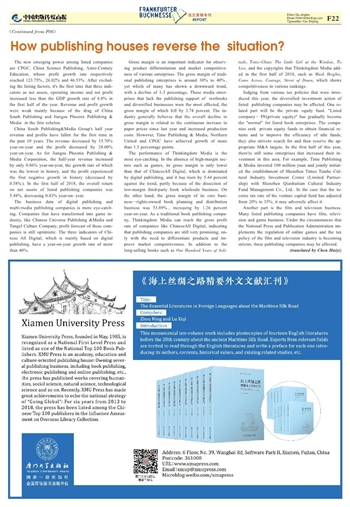Till the end of August, 21 Chinese listed publishing companies including China Publishing & Media Holdings Co.(CPMH, also called CPGC), China Science Publishing, Jiangsu Phoenix Publishing & Media Corporation, China South Publishing&Media Group, ChineseAll Digital, Thinkingdom Media Group, IReader Technology Company, Astro-Century Education, etc., have released their semi-annual report. It can be seen from the report that the main operating indicators such as net assets, revenue and net profit of listed companies still maintain a small increase, but the growth rate continues to decrease. With the overall economic situation descending, some traditional publishing companies face slow transformation and lack of innovation, the main reason of which is that proportion of revenues from digital and diversified products at some traditional publishing companies is still not high. However, the representative of traditional publishing, CPGC and the digital publishing representative, ChineseAll Digital, have experienced relatively strong growth, showing possibilities for publishing industry to reverse the trend.
In the first half of 2018, the net assets of these 21 listed publishing companies totaled 117.30 billion yuan, increasing 11.14% year-on-year; operating income totaled 50.793 billion yuan, increasing 4.50% year-on-year; net profit totaled 6.431 billion yuan, increasing 3.18% year-on-year. Net assets increased by more than double digits mainly due to the fact that since the second half of 2017, CPGC, IReader Technology, Shandong Publishing and Astro-Century Education listed in Shanghai and Shenzhen. After excluding the listing factors, the net asset growth rate was 6.67%.(Continued on F22) (Continued from F06)
The new emerging power among listed companies are CPGC, China Science Publishing, Astro-Century Education, whose profit growth rate respectively reached 123.75%, 26.02% and 46.53%. After excluding the listing factors, it's the first time that three indicators as net assets, operating income and net profit increased less than the GDP growth rate of 6.8% in the first half of the year. Revenue and profit growth were weak mainly because of the drag of China South Publishing and Jiangsu Phoenix Publishing & Media in the first echelon.
China South Publishing&Media Group's half year revenue and profits have fallen for the first time in the past 10 years. The revenue decreased by 15.70% year-on-year and the profit decreased by 28.00% year-on-year. As for Jiangsu Phoenix Publishing & Media Corporation, the half-year revenue increased by only 0.86% year-on-year, the growth rate of which was the lowest in history, and the profit experienced the first negative growth in history (decreased by 0.58%). In the first half of 2018, the overall return on net assets of listed publishing companies was 5.48%, decreasing 0.43% year-on- year.
The business data of digital publishing and multi-media publishing companies is more eye-catching. Companies that have transformed into game industry, like Chinese Universe Publishing &Media and Tangel Culture Company, profit forecast of these companies is still optimistic. The three indicators of Chinese All Digital, which is mainly based on digital publishing, have a year-on-year growth rate of more than 40%.
Gross margin is an important indicator for observing product differentiation and market competitiveness of various enterprises. The gross margin of tradional publishing enterprises is around 30% to 40%, yet which of many has shown a downward trend, with a decline of 1-3 percentage. Those media enterprises that lack the publishing support of textbooks and diversified businesses were the most affected, the gross margin of which fell by 3.74 percent. The industry generally believes that the overall decline in gross margin is related to the continuous increase in paper prices since last year and increased production costs. However, Time Publishing & Media, Northern United and CPGC have achieved growth of more than 1.5 percentage points.
The performance of Thinkingdom Media is the most eye-catching. In the absence of high-margin sectors such as games, its gross margin is only lower than that of ChineseAll Digital, which is dominated by digital publishing, and it has risen by 5.44 percent against the trend, partly because of the dissection of low-margin third-party book wholesale business. On the other hand, the gross margin of its core business—rights-owned book planning and distribution business was 53.89%, increasing by 1.26 percent year-on-year. As a traditional book publishing company, Thinkingdom Media can reach the gross profit rate of companies like ChineseAll Digital, indicating that publishing companies are still very promising, only with the need to differentiate products and improve market competitiveness. In addition to the long-selling books such as One Hundred Years of Solitude, Totto-Chan: The Little Girl at the Window, To Live, and the copyrights that Thinkingdom Media added in the first half of 2018, such as Mask Heights, Come Across, Courage, Street of Dawn, which shows competitiveness in various rankings.
Judging from various tax policies that were introduced this year, the diversified investment action of listed publishing companies may be affected. One related part will be the private equity fund. "Listed company+ PE(private equity)" has gradually become the "normal" for listed book enterprises. The companies seek private equity funds to obtain financial returns and to improve the efficiency of idle funds; they also striveto search for and then reserve the appropriate M&A targets. In the first half of this year, there're still some enterprises that increased their investment in this area. For example, Time Publishing & Media invested 100 million yuan and jointly initiated the establishment of Shenzhen Times Tianhe Cultural Industry Investment Center (Limited Partnership) with Shenzhen Qianhaitian Cultural Industry Fund Management Co., Ltd.. In the case that the income tax rate of the venture capital fund has adjusted from 20% to 35%, it may adversely affect it.
Another part is the film and television business. Many listed publishing companies have film, television and game business. Under the circumstances that the National Press and Publication Administration implements the regulation of online games and the tax policy of the film and television industry is becoming stricter, these publishing companies may be affected.
(translated by Chen Huiyi)


